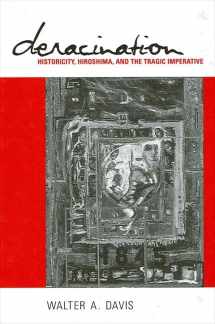
Deracination: Historicity, Hiroshima, and the Tragic Imperative (Suny Series in Psychoanalysis and Culture)
ISBN-13:
9780791448342
ISBN-10:
0791448347
Edition:
First Edition
Author:
Walter A. Davis
Publication date:
2001
Publisher:
State Univ of New York Pr
Format:
Paperback
301 pages
FREE US shipping
Book details
ISBN-13:
9780791448342
ISBN-10:
0791448347
Edition:
First Edition
Author:
Walter A. Davis
Publication date:
2001
Publisher:
State Univ of New York Pr
Format:
Paperback
301 pages
Summary
Deracination: Historicity, Hiroshima, and the Tragic Imperative (Suny Series in Psychoanalysis and Culture) (ISBN-13: 9780791448342 and ISBN-10: 0791448347), written by authors
Walter A. Davis, was published by State Univ of New York Pr in 2001.
With an overall rating of 4.5 stars, it's a notable title among other
Psychoanalysis
(Psychology & Counseling, Social Psychology & Interactions, Historiography, Historical Study & Educational Resources, Essays, Psychoanalysis, Psychology, Social Psychology & Interactions, Epistemology, Philosophy) books. You can easily purchase or rent Deracination: Historicity, Hiroshima, and the Tragic Imperative (Suny Series in Psychoanalysis and Culture) (Paperback) from BooksRun,
along with many other new and used
Psychoanalysis
books
and textbooks.
And, if you're looking to sell your copy, our current buyback offer is $0.2.
Description
Attempts to comprehend the traumatic significance of Hiroshima in order to construct a new theory of history.
Through a critique of history―as a reality, a discipline, and a way of writing―Deracination challenges the basic theoretical tenets of both humanism and postmodernism. As a discipline, history is currently undergoing what Heidegger would call a productive “crisis," and a number of thinkers, including Michel Foucault, Hayden White, Paul Ricoeur, and Stephen Greenblatt, have begun to reexamine the cognitive assumptions and narrative paradigms that inform the discipline. This book radicalizes such developments in order to construct both a new theory of history as well as a new concept of how histories should be written. To make the interrogation concrete, the book focuses on Hiroshima and the ways in which the trauma of that event has been repressed by the discourses that historians have fashioned in order to “explain” what happened on August 6, 1945.
Through a critique of history―as a reality, a discipline, and a way of writing―Deracination challenges the basic theoretical tenets of both humanism and postmodernism. As a discipline, history is currently undergoing what Heidegger would call a productive “crisis," and a number of thinkers, including Michel Foucault, Hayden White, Paul Ricoeur, and Stephen Greenblatt, have begun to reexamine the cognitive assumptions and narrative paradigms that inform the discipline. This book radicalizes such developments in order to construct both a new theory of history as well as a new concept of how histories should be written. To make the interrogation concrete, the book focuses on Hiroshima and the ways in which the trauma of that event has been repressed by the discourses that historians have fashioned in order to “explain” what happened on August 6, 1945.


We would LOVE it if you could help us and other readers by reviewing the book
Book review

Congratulations! We have received your book review.
{user}
{createdAt}
by {truncated_author}


